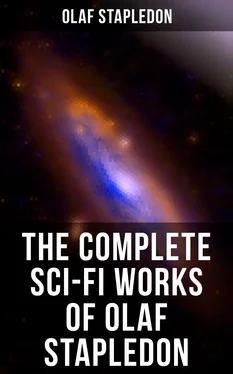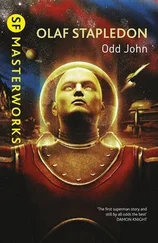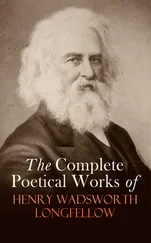Olaf Stapledon - The Complete Sci-Fi Works of Olaf Stapledon
Здесь есть возможность читать онлайн «Olaf Stapledon - The Complete Sci-Fi Works of Olaf Stapledon» — ознакомительный отрывок электронной книги совершенно бесплатно, а после прочтения отрывка купить полную версию. В некоторых случаях можно слушать аудио, скачать через торрент в формате fb2 и присутствует краткое содержание. Жанр: unrecognised, на английском языке. Описание произведения, (предисловие) а так же отзывы посетителей доступны на портале библиотеки ЛибКат.
- Название:The Complete Sci-Fi Works of Olaf Stapledon
- Автор:
- Жанр:
- Год:неизвестен
- ISBN:нет данных
- Рейтинг книги:5 / 5. Голосов: 1
-
Избранное:Добавить в избранное
- Отзывы:
-
Ваша оценка:
- 100
- 1
- 2
- 3
- 4
- 5
The Complete Sci-Fi Works of Olaf Stapledon: краткое содержание, описание и аннотация
Предлагаем к чтению аннотацию, описание, краткое содержание или предисловие (зависит от того, что написал сам автор книги «The Complete Sci-Fi Works of Olaf Stapledon»). Если вы не нашли необходимую информацию о книге — напишите в комментариях, мы постараемся отыскать её.
Novels:
Last and First Men: A Story of the Near and Far Future
Last Men in London
Odd John: A Story Between Jest and Earnest
Star Maker
Darkness and the Light
Sirius: A Fantasy of Love and Discord
Death into Life
Short Stories:
The Flames (1947)
The Seed and the Flower
The Road to the Aide Post
A Modern Magician
East is West
A World of Sounds
Arms Out of Hand
The Complete Sci-Fi Works of Olaf Stapledon — читать онлайн ознакомительный отрывок
Ниже представлен текст книги, разбитый по страницам. Система сохранения места последней прочитанной страницы, позволяет с удобством читать онлайн бесплатно книгу «The Complete Sci-Fi Works of Olaf Stapledon», без необходимости каждый раз заново искать на чём Вы остановились. Поставьте закладку, и сможете в любой момент перейти на страницу, на которой закончили чтение.
Интервал:
Закладка:
A close study of the relations of these very different intelligences would be enlightening, but we have no time for it. Within their own sphere the monkeys showed perhaps a quicker wit than the men; but only within very narrow limits did their intelligence work at all. They were deft at finding new means for the better satisfaction of their appetites. But they wholly lacked self-criticism. Upon a normal outfit of instinctive needs they had developed many acquired, traditional cravings, most of which were fantastic and harmful. The Second Men, on the other hand, though often momentarily outwitted by the monkeys, were in the long run incomparably more able and more sane.
The difference between the two species is seen clearly in their reaction to metals. The Second Men sought metal solely for the carrying on of an already well-advanced civilization. But the monkeys, when for the first time they saw the bright ingots, were fascinated. They had already begun to hate the invaders for their native superiority and their material wealth; and now this jealousy combined with primitive acquisitiveness to make the slabs of copper and tin become in their eyes symbols of power. In order to remain unmolested in their work, the invaders had paid a toll of the wares of their own country, of baskets, pottery, and various specially designed miniature tools. But at the sight of the crude metal, the monkeys demanded a share of this noblest product of their own land. This was readily granted, since it did away with the need of bringing goods from Asia. But the monkeys had no real use for metal. They merely hoarded it, and became increasingly avaricious. No one had respect among them who did not laboriously carry a great ingot about with him wherever he went. And after a while it came to be considered actually indecent to be seen without a slab of metal. In conversation between the sexes this symbol of refinement was always held so as to conceal the genitals.
The more metal the monkeys acquired the more they craved. Blood was often shed in disputes over the possession of hoards. But this internecine strife gave place at length to a concerted movement to prevent the whole export of metal from their land. Some even suggested that the ingots in their possession should be used for making more effective weapons, with which to expel the invaders. This policy was rejected, not merely because there were none who could work up the crude metal, but because it was generally agreed that to put such a sacred material to any kind of service would be base.
The will to be rid of the invader was augmented by a dispute about the submen. These abject beings were treated very harshly by their masters. Not only were they overworked, but also they were tortured in cold blood, not precisely through lust in cruelty, but through a queer sense of humour, or delight in the incongruous. For instance, it afforded the monkeys a strangely innocent and extravagant pleasure to compel these cattle to carry on their work in an erect posture, which was by now quite unnatural to them, or to eat their own excrement or even their own young. If ever these tortures roused some exceptional subman to rebel, the monkeys flared into contemptuous rage at such a lack of humour, so incapable were they of realizing the subjective processes of others. To one another they could, indeed, be kindly and generous; but even among themselves the imp of humour would sometimes run riot. In any matter in which an individual was misunderstood by his fellows, he was sure to be gleefully baited, and often harried to death. But in the main it was only the slave-species that suffered.
The invaders were outraged by this cruel imbecility, and ventured to protest. To the monkeys the protest was unintelligible. What were cattle for, but to be used in the service of superior beings? Evidently, the monkeys thought, the invaders were after all lacking in the finer capacities of mind, since they failed to appreciate the beauty of the fantastic.
This and other causes of friction finally led the monkeys to conceive a means of freeing themselves for ever. The Second Men had proved to be terribly liable to the diseases of their wretched subhuman kinsfolk. Only by very rigorous quarantine had they stamped out the epidemic that had revealed this fact. Now partly for revenge, but partly also through malicious delight in the topsy-turvy, the monkeys determined to make use of this human weakness. There was a certain nut, very palatable to both men and monkeys, which grew in a remote part of the country. The monkeys had already begun to barter this nut for extra metal; and the pioneering Second Men were arranging to send caravans laden with nuts into their own country. In this situation the monkeys found their opportunity. They carefully infected large quantities of nuts with the plagues rampant among those herds of submen which had not been domesticated. Very soon caravans of infected nuts were scattered over Asia. The effect upon a race wholly fresh to these microbes was disastrous. Not only were the pioneering settlements wiped out, but the bulk of the species also. The submen themselves had become adjusted to the microbes, and even reproduced more rapidly because of them. Not so the more delicately organized species. They died off like autumn leaves. Civilization fell to pieces. In a few generations Asia was peopled only by a handful of scattered savages, all diseased and mostly crippled.
But in spite of this disaster the species remained potentially the same. Within a few centuries it had thrown off the infection and had begun once more the ascent towards civilization. After another thousand years, pioneers again crossed the mountain and entered Africa. They met with no opposition. The precarious flicker of simian intelligence had long ago ceased. The monkeys had so burdened their bodies with metal and their minds with the obsession of metal, that at length the herds of subhuman cattle were able to rebel and devour their masters.
3. THE ZENITH OF THE SECOND MEN
Table of Contents
For nearly a quarter of a million years the Second Men passed through successive phases of prosperity and decline. Their advance to developed culture was not nearly so steady and triumphal as might have been expected from a race of such brilliance. As with individuals, so with species, accidents are all too likely to defeat even the most cautious expectations. For instance, the Second Men were for a long time seriously hampered by a ‘glacial epoch’ which at its height imposed Arctic conditions even as far south as India. Little by little the encroaching ice crowded their tribes into the extremity of that peninsula, and reduced their culture to the level of the Esquimaux. In time, of course, they recovered, but only to suffer other scourges, of which the most devastating were epidemics of bacteria. The more recently developed and highly organized tissues of this species were peculiarly susceptible to disease, and not once but many times a promising barbarian culture or ‘medieval’ civilization was wiped out by plagues.
But of all the natural disasters which befell the Second Men, the worst was due to a spontaneous change in their own physical constitution. Just as the fangs of the ancient sabre-toothed tiger had finally grown so large that the beast could not eat, so the brain of the second human species threatened to outgrow the rest of its body. In a cranium that was originally roomy enough, this rare product of nature was now increasingly cramped; while a circulatory system, that was formerly quite adequate, was becoming more and more liable to fail in pumping blood through so cramped a structure. These two causes at last began to take serious effect. Congenital imbecility became increasingly common, along with all manner of acquired mental diseases. For some thousands of years the race remained in a most precarious condition, now almost dying out, now rapidly attaining an extravagant kind of culture in some region where physical nature happened to be peculiarly favourable. One of these precarious flashes of spirit occurred in the Yang-tze valley as a sudden and brief effulgence of city states peopled by neurotics, geniuses and imbeciles. The lasting upshot of this civilization was a brilliant literature of despair, dominated by a sense of the difference between the actual and the potential in man and the universe. Later, when the race had attained its noontide glory, it was wont to brood upon this tragic voice from the past in order to remind itself of the underlying horror of existence.
Читать дальшеИнтервал:
Закладка:
Похожие книги на «The Complete Sci-Fi Works of Olaf Stapledon»
Представляем Вашему вниманию похожие книги на «The Complete Sci-Fi Works of Olaf Stapledon» списком для выбора. Мы отобрали схожую по названию и смыслу литературу в надежде предоставить читателям больше вариантов отыскать новые, интересные, ещё непрочитанные произведения.
Обсуждение, отзывы о книге «The Complete Sci-Fi Works of Olaf Stapledon» и просто собственные мнения читателей. Оставьте ваши комментарии, напишите, что Вы думаете о произведении, его смысле или главных героях. Укажите что конкретно понравилось, а что нет, и почему Вы так считаете.












